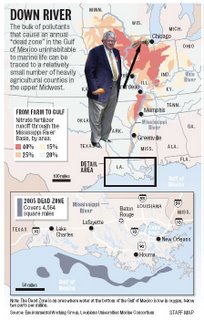
The CIA fired an employee...for leaking classified information:
WASHINGTON - In a highly unusual move, the CIA has fired an employee for leaking classified information to the news media, including details about secret CIA prisons in Eastern Europe that resulted in a Pultizer Prize-winning story, officials said Friday.
A federal criminal investigation has also been opened.
CIA Director Porter Goss announced the firing in a short message to agency employees circulated Thursday. It is the first time since he took over in August 2004, vowing to clamp down on leaks, that he has dismissed an intelligence officer for speaking with reporters.
Agency spokesman Paul Gimigliano confirmed an officer had been fired for having unauthorized contacts with the media and disclosing classified information to reporters, including details about intelligence operations.
"The officer has acknowledged unauthorized discussions with the media and the unauthorized sharing of classified information," Gimigliano said. "That is a violation of the secrecy agreement that everyone signs as a condition of employment with the CIA."
And hey, is that Karl Rove on the escalator?


















